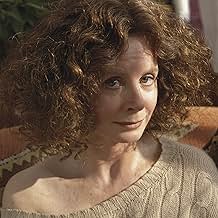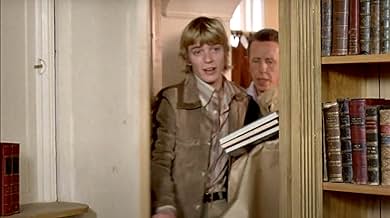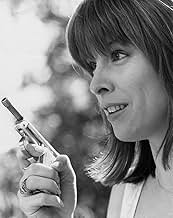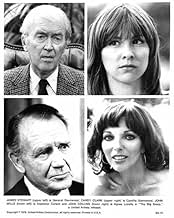Aggiungi una trama nella tua linguaA grizzled American private detective in England investigates a complicated case of blackmail-turned-murder involving a rich but honest elderly general, his two loose socialite daughters, a ... Leggi tuttoA grizzled American private detective in England investigates a complicated case of blackmail-turned-murder involving a rich but honest elderly general, his two loose socialite daughters, a pornographer, and a gangster.A grizzled American private detective in England investigates a complicated case of blackmail-turned-murder involving a rich but honest elderly general, his two loose socialite daughters, a pornographer, and a gangster.
- Regia
- Sceneggiatura
- Star
- Karl Lundgren
- (as Simon Turner)
Recensioni in evidenza
In addition, Chandler's convoluted plot (originally derived from two or three separate short stories) didn't offer an easy screen translation, even before all the "juicy parts" were excised.
So this must have seemed like a great idea. Robert Mitchum had successfully played Philip Marlowe a few years earlier in "Farewell, My Lovely", and the MPAA ratings system meant that they could be as explicit as they wanted; the filmmakers could be more faithful to Chandler's novel *and* show us Candy Clark nude! How could we go wrong?
In lots of ways, unfortunately. First up, Mitchum didn't seem to fit the role of Marlowe nearly as well in this movie as he did in "Farewell, My Lovely". This makes me suspect that the earlier story was more deftly tailored to Mitchum's age and acting style, with lots of references to how old and tired Marlowe feels. In this case, the script sticks very closely -- basically scene-by-scene, almost line-by-line -- to the original novel, but Mitchum doesn't fit the part as well, somehow. In the book, Marlowe was very much "in your face", giving a hard time to everyone from the cops to Eddie Mars to the Sternwood girls. That means that in this movie, Mitchum's nonchalant style doesn't fit with many of the scenes he has to play. Bogart was "nonchalant" too, I guess, but in a different way. Bogie's tough guys would feign casualness, but they always seemed like they were waiting for the other guy to start something, and when Bogart dug in and got to work, he took it seriously. Mitchum just seems like he couldn't care less one way or the other. It doesn't work for this story, where the second half is driven by Marlowe's desire to find out the truth even when he isn't being paid to do so.
The move from L.A. to London didn't bother me at all. It made an interesting, coincidental "bridge" between the classic films noir and more recent movies about London gangs like "Snatch".
But the deepest problem with this film is that while it follows the externals of Chandler's novel much more closely in terms of the plot and (most of) the dialogue, it fails utterly to capture the real heart and soul of the novel. Of course, the earlier movie version did, too -- this novel may well be unfilmable -- but at least it had Bogie and Bacall. This one has Mitchum and Miles. And Candy Clark nude. And not much else.
Take a look at the beginning of the movie. The second scene, where Marlowe visits General Sternwood in the greenhouse, is probably one of the classics of 20th century popular literature. Few other novels begin with a scene which so completely evoke their characters, and atmosphere, as Marlowe sweats, gags on the scent of orchids, and converses with a tired, bitter, old, rich man clinging to his miserable life. Chandler is hitting you hard with every trick in his bag, and his timing, dialogue and characterization are flawless. Howard Hawks' screenwriters were smart enough to leave much of his original dialogue in this scene. By contrast, in the Mitchum film, scene after scene features lines taken verbatim from the novel, but for some reason, they chose to leave out some of the best: "How do you like your brandy, sir?" "Any way at all." or the all-time classic, "A nice state of affairs when a man has to indulge his vices by proxy". If the screenwriters chose to leave in lines about Pekineses and loogans, how could they possibly leave these ones out?
Maybe they thought that such lines wouldn't sound right coming out of James Stewart -- they were probably right -- but that just shows what an inept choice he was for this part. General Sternwood is supposed to be incredibly bitter, yet we're given a typical Stewart performance; he almost looks perky, certainly not broken by life. He looks physically weak but hardly seems cynical or jaded enough to have produced two such screwed-up daughters. It wasn't even made clear why he was sitting out in the greenhouse, and Marlowe doesn't seem particularly uncomfortable while he's out there (although a later reference to Rusty Regan "sweating like a pig" is left in). It's just a mess, and does nothing at all to set us up for what follows.
To cite one further example, another key scene manages to miss the point completely while still following Chandler's plot closely. The scene where Harry Jones finally approaches Marlowe in Marlowe's office is the turning point of the entire novel. The case is closed, Marlowe is literally signing the check to deposit it, and Jones walks in with the exact piece of information Marlowe's been missing the entire time. Like so many scenes in the novel, this one is simply brilliant, overflowing with great dialogue ("She's too big for you"), and in some ways tying together the entire story. Yet after following most of the scene very closely, the script inexplicably stops short of some of Chandler's best writing:
"'This Regan was a cockeyed sort of buzzard. He had long-range eyes. He was looking over into the next valley all the time. He wasn't scarcely around where he was. I don't think he gave a damn about dough. And coming from me, brother, that's a compliment.'
"The little man wasn't so dumb after all. A three for a quarter grifter wouldn't even think such thoughts, much less know how to express them."
The filmmakers may have closely followed the plot of the original novel in this version, but the fact that they could leave out writing like this, while clinging almost religiously to most of the rest of the book, shows that they couldn't have been more clueless about the real "core" of Chandler's writing. Alas, it appears that we are still waiting for the definitive movie version; this one manages to reduce "The Big Sleep" to a barely-above-average TV movie-of-the-week with Candy Clark, nude.
Winner treats this material with quite a bit of humor, rendering it positively silly on a frequent basis. It makes one believe that he had contempt for it. But Chandlers' story is fortunately still engrossing, and it's the kind of thing that really keeps viewers on their toes, trying to pay attention to all the details and twists. (Since there's much exposition to digest, viewers can't afford to let their attention wander.) The film *looks* absolutely great, with fine use of locations and lovely photography. It's spiced up with some (tastefully done) nudity, but it's never ever very violent.
The main draw is a sterling group of American and British actors. Sarah Miles, Richard Boone, Joan Collins, Edward Fox, John Mills, Oliver Reed (typically amusing as a threatening gangster / casino owner), Harry Andrews, Colin Blakely, Richard Todd, Diana Quick, and James Donald are all present and accounted for. Mitchum anchors the proceedings with his colorful performance, but dragging things down quite a bit is the way overdone airhead shtick by Candy Clark, playing Sternwoods' younger daughter. Usually she's pretty reliable, but here she's much too annoying. Mitchum and company do have fun with the sometimes witty and lively dialogue.
Well paced, and fairly energetic, but overall not especially memorable. Some people might want to just revisit the Bogie and Bacall version instead.
Six out of 10.
It came as a surprise to me that Michael Winner was the director for the film. A man I associate with expensive dinners at expensive restaurants. But after watching this, and Death Wish, I have a new-found respect for eating in style. This film is not a Peckinpah, but it still manages to be incredibly effective in it's delivery. I like the car Mitchum drives too, a Mercedes soft-top.
The video is in widescreen by the way, requiring a screen re-adjustment or it'll look silly. Great performances from all of the actors and a superbly enjoyable plot in a film that has aged very well.
Some people criticised this film for being in the English countryside and that it doesn't bear up with the film noir style. I disagree, film noir is not limited to shady city streets, as this film goes to show.
And that's what makes it so difficult to transfer his works to the screen. You almost have to have a voice-over from Philip Marlowe otherwise you not only get lost in the various plot twists but you miss the adamantly low-brow tropes -- "her hair was the color of gold in old paintings," or, "she threw me a glance I could feel in my hip pocket." "Chinatown," set in 1937 LA, was released to great critical and public acclaim in 1974. The very next year, Robert Mitchum tackled Philip Marlowe in "Farewell, My Lovely" and he was great, and so was the production, even if it was not the masterpiece that "Chinatown" was. Nobody will ever make a masterpiece out of a Chandler story because, after all, a masterpiece usually starts out with a coherent plot.
So the trick is to capture on screen what Chandler's prose evokes on the written page. Style is everything. "Farewell My Lovely" had it. "The Big Sleep," alas, doesn't. The director hasn't really done much to help things. In the 1946 version of "The Big Sleep," Howard Hawks at least had some fun with the characters. (Bogart and the horn-rimmed glasses in the book shop.) Hawks also allowed some humor in the dialog. ("She tried to sit in my lap while I was standing up.") Philip Marlowe with his resolutely seedy presence belongs in the marginal zone of Los Angeles, not in the uptrodden neighborhoods of London. He belongs in a trench coat, wearing an older fedora, not in the powder blue suits of Saville Row. ("I own a hat and a coat and a gun," he tells Nulty in "Farewell My Lovely," "and everything I touch turns to s***.") In this film we have to put up with a confident and compassionate Marlowe, striding through the fancy decor instead of slouching, never touching a drop of alcohol. And Mitchum doesn't add much to the story besides his usual heft. As James Agee once said of him, his casual languor suggests Bing Crosby supersaturated on barbiturates.
That reminds me. I couldn't help wondering, while I watched this, how much booze had gone into the production. I forget whether Chandler had quit drinking by the time he wrote this, but Mitchum himself was hardly an amateur. Olivier had kicked Cyril Cusack out of the Old Vic for showing up drunk for a performance of "Doctor's Dilemma" and reciting lines from another of Shaw's plays. Richard Boone was evidently immobilized during his last few years and Oliver Reed died of drink.
Still, look at the actors in this thing. In support are Edward Fox, Harry Andrews, James Donald, Colin Blakely, James Stewart, and Richard Todd. And all of them are up to the task, true professionals, with not a hollow note struck. I'm tempted to call the cast "peerless" but I don't know if it's permitted if there's a theatrical knight among them. Richard Boone is outstanding as Canino -- a villainous wreck, hobbling about on a broken foot, cackling over his own sliminess, howling with unrestrained glee as he watches a harmless little man whom he has just poisoned crash through a glass door and die.
Also notable are the locations and the art direction. It may not be sleazy Los Angeles in 1941 but London and its interiors look just fine. London has never looked less grimy. There is no rain or fog, the streets are clean, narrow and lined with classy book shops, and people tend to drive new and expensive cars.
Well, the movie is done with dash and style, no doubt about that. But it's the wrong style. Marlowe belongs in the 1940s. In the 1940s pornography and dope could get you serious jail time -- just ask Mitchum.
I didn't much care for it the first time I saw this. The second time was easier going because I'd lowered the bar of my expectation.
Lo sapevi?
- QuizJames Stewart had difficulty saying his lines on time due to hearing and possibly memory problems. Some of the cast were shocked by his aged appearance. Robert Mitchum recalled, "The picture was all about corpses, but Jimmy looked deader than any of them." Stewart actually outlived Mitchum by one day, nearly 20 years later.
- BlooperWhen Marlowe takes the gun from Camilla after she unloads it on him with multiple blank rounds, he grabs the barrel with his bare hands. That should have proved to be very painful as the barrel would be extremely hot.
EDIT: This is incorrect. Blank cartridges in a small calibre gun will not heat the barrel to any great extent. A gun barrel gets hot mainly due to the friction of the bullet going through the barrel, not from the powder in the cartridge.
- Citazioni
Charlotte Sternwood: [when Marlowe declines to blackmail her] Wha-? You don't want money?
Philip Marlowe: Oh sure. All I itch for is money. I'm so greedy that for fifty pounds a day plus expenses on the day I work, I risk my future, the hatred of the cops, of Eddie Mars and his pals, I dodge bullets and put up with slaps and say "Thank you very much. If you have any further trouble please call me: I'll just put my card here on the table." I do all that for a few pounds. And maybe just a little bit to protect what little pride a sick and broken old man has in his family, so that he can believe his blood is not poisoned. That his little girls - though they may be a trifle wild - are not perverts and killers.
- ConnessioniFeatured in James Stewart, Robert Mitchum: The Two Faces of America (2017)
I più visti
Dettagli
- Data di uscita
- Paesi di origine
- Lingua
- Celebre anche come
- The Big Sleep
- Luoghi delle riprese
- Knebworth House, Knebworth, Hertfordshire, Inghilterra, Regno Unito(Sternwood Mansion)
- Aziende produttrici
- Vedi altri crediti dell’azienda su IMDbPro
Botteghino
- Budget
- 3.000.000 £ (previsto)
Contribuisci a questa pagina






































